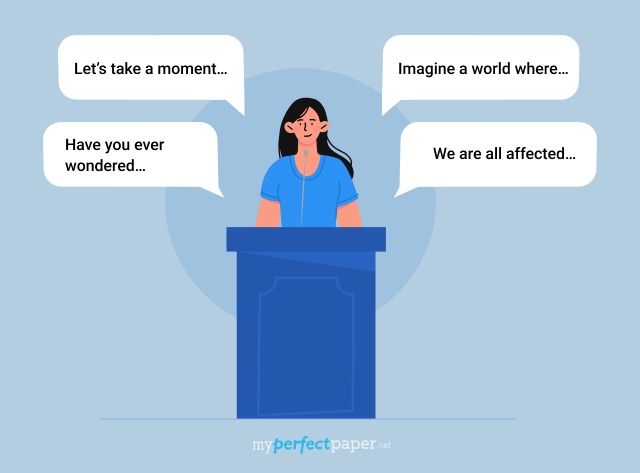What is an Introduction Speech?
An introduction speech is simply when you introduce yourself, someone else, or an idea to an audience. It’s short but important, setting the tone for what comes next.
There are two main types:
- Self-introduction speech: The introduction speech about yourself can be used in an interview or a meeting.
- Guest introduction speech: This is when you introduce someone else, like a speaker or special guest
Purpose and Importance
Why does an introduction speech matter? Here’s why:
- Builds connection: A good intro helps you connect with your audience. It makes them more interested in what you have to say.
- Sets the tone: It prepares your audience for what’s coming next. It gives them a sense of what to expect.
- Boosts confidence: Having a clear intro makes you feel more confident and less nervous.
- Shows professionalism: A strong intro makes you look prepared and credible.
- Engages the audience: A great intro grabs attention and makes people want to listen.
Key Elements of an Effective Introduction Speech
If you're introducing yourself or someone else, there are key parts you need to include to grab attention and set the right tone.
Here are the main elements to focus on:
- Greeting: Start with a simple greeting to welcome the audience and set a friendly tone.
- Introduction of Yourself or Guest: If you’re introducing yourself, share your name and a little about who you are. If you’re introducing someone else, say their name and why they’re important.
- Purpose or Reason for Introduction: Let the audience know why you're speaking and what they can expect next.
- Establish Connection: Try to connect with your audience by saying something relatable or interesting. This makes them pay attention.
- Closing Statement: Wrap up with a smooth transition to the next part of the event or introduce the next speaker.
Steps for Preparation and Planning Introduction Speech
Planning your introduction speech helps you sound confident and clear. It’s all about getting ready before you speak.
Let’s break down the steps for preparation.
Research the Audience and Occasion
Know who you’re speaking to and what the event is about. This helps you make your speech more relevant.
Steps to do this:
- Think about who your audience is and what they like.
- Understand what the event is for.
- Make your speech fit the tone and purpose of the event.
Define the Purpose
Be clear about why you’re giving the speech. It helps you stay focused.
Steps to do this:
- Know if you’re introducing yourself, a guest, or an idea.
- Keep your purpose simple.
- Make sure everything you say ties back to the reason for your speech.
Choose the Right Structure
A good speech format keeps your speech organized. Here is how you can create an introduction speech outline:
- Greet the audience: Start with a warm welcome.
- Introduce yourself or the speaker: Give a brief introduction.
- State the purpose: Explain why you're speaking.
- Outline key points: List the main ideas in order.
- End with a transition: Lead smoothly into the next part.
Take a look at this outline example to get started:
I. Opening
II. Purpose of the Speech
III. Main Content
IV. Closing
|
Simple Steps for Writing the Speech
Writing your introduction speech is about getting your ideas clear and making them interesting.
Let’s break it down into simple steps.
Write the Introduction
Start with something that grabs attention and feels welcoming.
Steps to do this:
- Begin with a simple greeting.
- Keep it short and warm, so the audience feels comfortable.
- Mention the person or event you're introducing.
Develop the Body
This is where you introduce the person or topic and give important details.
Steps to do this:
- Give a brief background of who you’re introducing.
- Keep it short and relevant to the audience.
- Avoid long stories or too many details—keep it simple.
Use Rhetorical Devices
Rhetorical devices help make your speech more interesting and memorable.
Steps to do this:
- Use a short story or example to connect with the audience.
- Add humor if it fits, but keep it professional.
- Include a quote or fact that makes the speech stand out.
Steps for Refining and Practicing an Introduction Speech
Once you’ve written your speech, it’s time to practice and polish it.
Let’s focus on how to refine your speech.
Edit and Revise
Check your speech to make sure it’s clear and to the point.
Steps to do this:
- Read your speech out loud to see how it sounds.
- Cut out any extra words to make it shorter.
- Make sure your tone fits the event.
Rehearse Your Delivery
Practicing helps you feel more comfortable and confident.
Steps to do this:
- Practice in front of a mirror to see how you look.
- Record yourself and listen for ways to improve.
- Time yourself to make sure you don’t go over time.
Seek Feedback
Ask someone else for their opinion to make your speech better.
Steps to do this:
- Have a friend or colleague listen to your speech.
- Ask them for feedback on how you speak and if it’s clear.
- Use their feedback to improve.
Introduction Speech Examples and Templates
Here are some examples for different occasions, along with templates to help you write your own introduction speech:
Mistakes Different People Make & How to Avoid Them
Introduction speeches can be tricky, but knowing the common mistakes can help you avoid them.
Here are some mistakes students, teachers, and public speakers make and how to fix them.
Mistakes for Students
Here's how students can keep things smooth and effective:
Talking Too Much:
Students often try to say too much, making their speech too long.
- How to avoid it: Keep your introduction short and simple. Just say who you are, why you're speaking, and what will happen next.
Not Connecting with the Audience:
Students sometimes forget to make the speech relatable to the audience.
- How to avoid it: Make a simple connection. Ask a question or say something that will interest the audience.
Speaking Too Fast or Too Quietly:
Nerves can make students talk too fast or too softly.
- How to avoid it: Practice speaking clearly and at a steady pace. Remember to breathe deeply and relax.
Mistakes for Teachers
Teachers face their own set of challenges when giving introduction speeches. Here’s how to avoid common mistakes:
Giving Too Much Information:
Teachers sometimes add too many details, and it can make the introduction boring.
- How to avoid it: Focus on the main points. Keep it short and introduce the speaker or topic clearly.
Not Being Excited:
If teachers sound boring or too serious, the audience might lose interest.
- How to avoid it: Be enthusiastic! Use a lively tone to keep the audience engaged.
Going Over Time:
Sometimes teachers talk too long during introductions.
- How to avoid it: Practice your speech and keep an eye on the time. Don’t speak for too long.
Mistakes for Public Speakers
Even experienced public speakers make mistakes. Here's how to avoid some common missteps:
Forgetting to Thank the Audience:
Some speakers forget to thank the audience before starting.
- How to avoid it: Always thank the audience for being there. It shows respect and appreciation.
Talking Too Much About Yourself:
Some speakers make the introduction all about themselves.
- How to avoid it: Focus on the event or the person you’re introducing, not just yourself.
Not Having a Clear Purpose:
Without a clear goal, the speech can confuse the audience.
- How to avoid it: Know what you want to achieve. Whether you’re introducing someone or explaining something, stay focused on the main point.
So there you have it!
A strong introduction speech is clear, to the point, and connects with your audience. By using the strategies and examples we’ve provided, you can easily create an introduction speech that stands out.
If you're a student looking for help, MyPerfectPaper.net’s paper writing service is here for you. Whether you need help with introduction speeches or any other type of speech, our speech writing service is just what you need.
With our guarantees and focus on quality, we’re here to make your academic life easier. Feel free to reach out to us for any writing help you need!
















